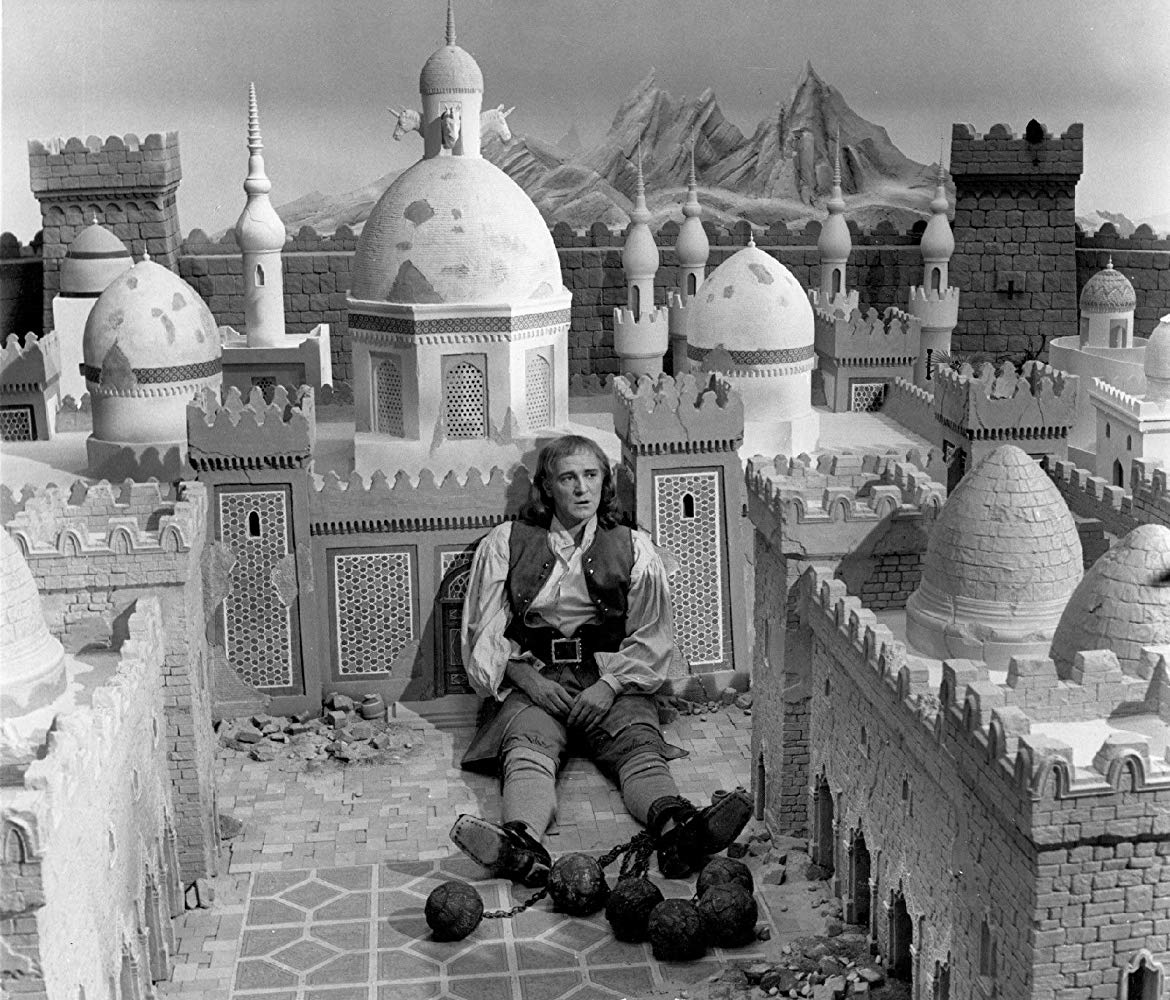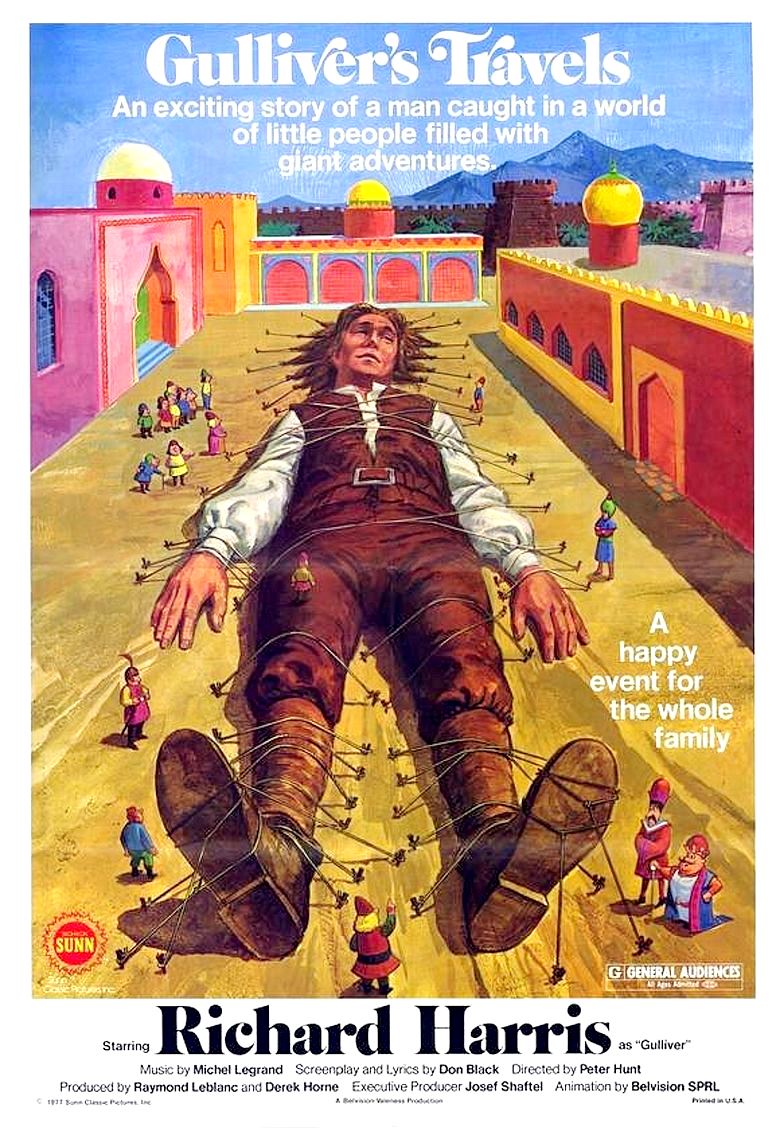UK/Belgium. 1977.
Crew
Director – Peter Hunt, Screenplay – Don Black, Based on the Novel Gulliver’s Travels (1726) by Jonathan Swift, Producers – Derek Horne & Raymond Leblanc, Photography – Alan Hume, Music – Michel Le Grand, Lyrics – Don Black, Production Design – Michael Stringer. Production Company – Valeness/Belvision.
Cast
Richard Harris (Dr Lemuel Gulliver), Catherine Schell (Mary)
Plot
1699. Bored with the prospect of becoming a Harley St doctor, Lemuel Gulliver signs up as a ship’s surgeon. However, his ship is wrecked at sea. He comes around to find himself a prisoner of the tiny people of Lilliput. He is released and welcomed but the Lilliputians soon see the giant-sized Gulliver as a drain on their resources and want him killed. They are then persuaded that Gulliver could be put to use aiding them in their war with the neighbouring kingdom of Blefescu, which is being fought over the way either nation should eat their boiled eggs. When Gulliver refuses to kill the Blefescans, factions within the Lilliputian government plot to do away with him.
This British-Belgian co-production is another children’s adaptation of Jonathan Swift’s classic novel Gulliver’s Travels (1726). The fact that this version is mounted as a children’s production rather than the scathing satire that Jonathan Swift originally wrote means per se that it is not a faithful adaptation. This version seems even less faithful an adaptation than previous attempts. All film adaptations (up until the 1995 tv mini-series) inevitably drop the voyages to the floating island of Laputa and the land of the Houyhnhnm talking horses that take place in Books III and IV, but this for some reason also drops the journey to Brobdingnag as well, apart from the abrupt twist ending where Gulliver sets sail and a giant appears out of the water to grab him. Perhaps the producers were saving that for a sequel?
While it may lack the breadth and scope of Jonathan Swift’s original work, the film maintains its own gently satiric story in its own more laidback way. The animated characters – villains who all but twirl their mustaches, the pudgy soft-hearted emperor, the heroic councillor – are irritably one-dimensional and so buffoonish they verge on the shrill. The behind-the-scenes political machinations are conducted with more ambiguity and cleverness than might be expected of the usual moral black-and-whites that inhabit kiddie animation.

The animation is flat and routine but the very act of placing the animation up against the live-action scenes involving Richard Harris manages to meld these shortcomings into a perfectly apportioned whole where neither the image of the courtly Harris and sketchily animated Lilliputians seem out of place. Harris, who has the unenviable job of reacting to an entire film that isn’t there, seems not unexpectedly a little bewildered by it all but crinkles his eyes nicely, has some okay songs and performs gamely.
Director Peter Hunt was better known as an editor and sometimes second unit director, particularly on the Sean Connery James Bond films. He made his directorial debut with the James Bond film On Her Majesty’s Secret Service (1969). He made several action films with Shout at the Devil (1976) and Wild Geese II (1985) and one other genre film with the cute alien film Hyper Sapien: People from Another Star (1986)
Other versions of Gulliver’s Travels are:– Georges Melies’s Gulliver’s Travels Among the Lilliputians and the Giants (1902); Segundo de Chomon’s Gulliver in the Land of the Giants (1903); a Russian version The New Gulliver (1934); Max Fleischer’s animated version Gulliver’s Travels (1939); The 3 Worlds of Gulliver (1960) from cult stop-motion animator Ray Harryhausen; a Japanese anime version Gulliver’s Travels Beyond the Moon (1965); a live-action Czech version in 1970; a live-action Hungarian version for tv in 1974: Gulliver in Lilliput (1982), a four-part BBC tv version; The Voyages of Gulliver (1983), an animated Spanish version; an American animated tv series Gulliver’s Travels (1992); Gulliver’s Travels (1995), a tv mini-series starring Ted Danson, the finest and most faithful of the adaptations and the only one to cover the entire book; the modernised film version Gulliver’s Travels (2010) starring Jack Black, which plays the story as a comedy; and the animated sequel Gulliver Returns (2021).
Trailer here


